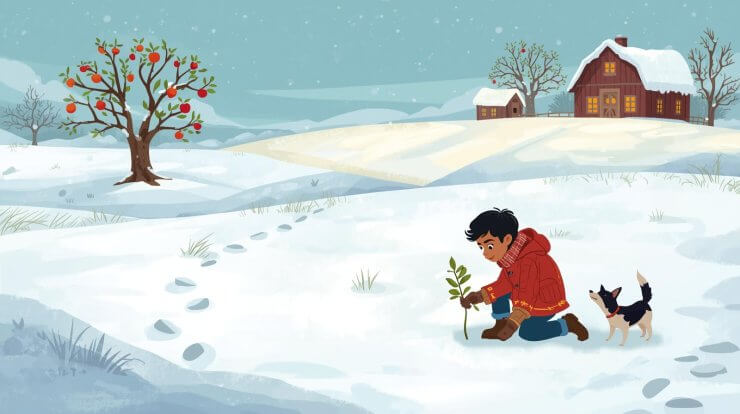Read by Matilda Longbottom

I grew up on a farm that has been in my family for a century—a place where the soil holds the weight of generations. My grandfather once turned the earth with ancient tractors that groaned against the rocky ground but never failed him. He knew every rise and furrow of the land, every patch that needed extra coaxing.
As children, my brother and I picked strawberries by hand, filling our buckets slowly because we ate more than we gathered. The sweetness of sun-warmed berries became the taste by which I measured every Summer. In those early years, I learned responsibility in small ways—sweeping the floor of the farm market in the mornings, stacking tomatoes in neat rows, arranging peaches so their golden skins caught the light just so.
Some days, I worked alongside Bea and her husband, John, harvesting snow peas or yellow squash. Bea was small, her back bent with age, yet she carried herself with the simplicity and wonder of a child. She made me feel seen, like I mattered, and that feeling still lingers—tied forever to the scent of freshly picked sugar snaps.
The fields were my playground. In the Winter wheat, I trampled paths and built horse jumps from field stones, leaping over them as if I was the horse. My little black-and-white poodle, Angel, would join in, soaring beside me with the boundless joy that only a child and a dog can know.
One Autumn, I pressed a Red Delicious apple seed into the earth. I watched in awe as it sprouted—small at first, fragile, but persistent. I had spent my whole life watching things grow, yet seeing something I planted take root felt like a quiet miracle. There’s something about planting your own tree—it connects you to time, to place, to the past and the future all at once.
I remember a photograph of my brother and me, still in our pajamas, holding radishes nearly as big as our heads. The farm gave us more than just food and space; it gave us belonging. In late Summer, we carved our names into young green pumpkins, and by Fall, our letters had grown thick like scars, permanent on their orange skins. Proof that we had been there. That we left a mark, however small.
As a teenager, I found quiet refuge in the fields, lying on a blanket in the rye, gazing at the endless sky and losing myself in books. The horizon stretched endlessly before me, just like my thoughts.
Years later, when I left the farm to teach art in Ghana with the Peace Corps, I carried my love of growing things with me. I saved avocado pits, coaxing them into seedlings in plastic bags, then passed them to the children to plant in their family farms. In San Francisco, I tended a lemon tree, a fig tree, and roses that bloomed in pinks and yellows, like the fading hues of a Summer sunset. A cutting from that same fig tree traveled with me across states, settling in Savannah and now Atlanta, its roots adapting—just as I had.
The farm taught me that life is in the tending. In the patience of planting a seed and waiting. In the joy of watching something thrive. And in the quiet understanding that even when you leave, pieces of you remain—etched into the land, woven into the roots, carried forward in new soil. ❖
About the Author: Dana Zullo is a Georgia-based poet and artist whose work has appeared in Paprika Southern, Literary Yard, Ink Pantry, and GreenPrints. Her artist biographies can be found in Crown Point Press guides, and she has received writer residencies at South Porch Artists and Sundress Academy for the Arts. A floral artist with the Ichiyo School of Ikebana, Dana’s love for nature is reflected in her creative work. Many seasons ago, she taught art in the Peace Corps in Ghana, where she continued her lifelong tradition of growing, sharing, and nurturing the seeds of the earth.


 Previous
Previous

